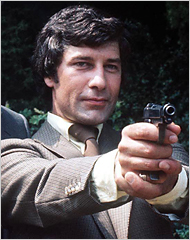Apparently, young boys are meant to be "reluctant readers" - at least according to this article in the Guardian. I'm not sure why boys, in particular, should need more pushing to read but I did find that when I was at school English lessons would stifle any interest in literature that I may possibly have had. I did read when I was at school but this tended to be masses of pulp Sci-Fi stories rather than more worthy novels. In fact, if I did find my way into serious literature it was more by way of reading Sci-Fi by the likes of George Orwell (1984) or Anthony Burgess (A Clockwork Orange) and moving on to their other works. I did end up reading more adventurous stuff at school but this tended to be at the recommendation of other teachers - my history teacher encouraged me to read Erich Maria Remarque's All Quiet on the Western Front as it would do far more justice to the history of the First World War than the official texts' dry analysis of the machinations of egocentric politicians.
My eldest boy reads lots. In part, I think, the fact that
he doesn't have a games console or computer in his bedroom helps. However, the
problem I have found with him is encouraging him to read out of his comfort
zone. I've taken him to the local library from a young age and for quite a
while he seemed to get books that were far too easy for his reading age. After
a while, I realised that he was fixated with the idea that he had to complete a
book at a single sitting. In fairness, the stories that I would read to him at
bedtime were very much in this format. Initially, these were Thomas the
Tank Engine or Bob the Builder stories. The Bob ones bored me
to death - most of the stories are complete mundanity, with Bob as a kind of
latter day Stakhanov; so I used to change them after a while and we got Bob
and the Tax Return, Bob and the Botch Job, Bob does one Cash in Hand and Spud
the Scarecrow gets Exterminated by Daleks. The Thomas ones were much better as
I can do a cracking Ringo Starr impression and the stories usually involve lots of action - a major rail disaster being a common theme. I eventually moved on to Grimm stories or some
other horror story to give him nightmares but the format still remained - one
story per sitting.
The problem with this came in the library because he
would see something that looked a bit longer than an hours read and would immediately be put off. After some cajoling, I managed to get him to read a Horrid
Henry story and, after completing one he immediately cleared through the whole
shelf of them. The next ones were Roddy Doyle (yes, he does children's stories as
well - at least I could spot too many rude words) and, after another push of
faith I managed to get him to read one (and soon all) Roald Dahl books. At this
point I started trying to read longer stories at bedtime - quite a few of them
being abridged classics which Grangemouth Library do a great line in. The
problem still seemed to be the same that anything that looked a bit bigger or
less familiar wouldn't catch his imagination.
I did get him to read a Douglas Adams book (Hitchhikers Guide to the
Galaxy) but failed with Terry Pratchett. You can lead a horse to water but you
can't make it drink.
However, I seemed to have a breakthrough last summer.
There was a Harry Potter film on TV which he decided that he must watch. I
wasn't so fussed on this (mainly because the football was on the other side)
and so I told him that he could only watch the film when he had read the book. We
were in Falkirk library a few days later and had a look at the JK Rowling
section - it was bare: the last of the Harry Potter films had just been
released and the shelves had cleared pretty much overnight. The reservation
list for the first book was at least three deep. I ended up ordering the book
second hand via Amazon. It arrived the next week and he had read the whole
thing by the weekend. I found the second book in charity shop and this lasted
just about as long. This went on for the next six weeks as he worked his way
through the ever longer books (over 700 pages in one volume). The size obstacle
seemed to have been overcome.
The other factor which seems to have helped is a
programme called Accelerated Reading which the school are running. This
involves the children choosing a book, either from a prescribed difficulty list
or of their own choosing, and then taking an online test to see just how much of
it they have taken in. They are awarded points depending on how well they do in
the quiz and the difficulty of the books. Of course, boys being boys, they do
tend to be quite competitive and have been racking up the books at quite a
rate. Since finishing the Potter series he has also tackled Tolkien's The
Hobbit and has almost completed the CS Lewis Narnia books which my brother
bought for his birthday present. It all seems rather removed from my diet of
pulp fiction but he does seem to be enjoying it all.
So how does one chose books for boys? I'm still not quite
sure. I think having a book rich environment with minimal distractions helps,
but it is still a case of trying to encourage reading without prescribing what
to read that is the difficulty. He seems to like the whole fantasy genre so maybe
I should try him with Pratchett again?










